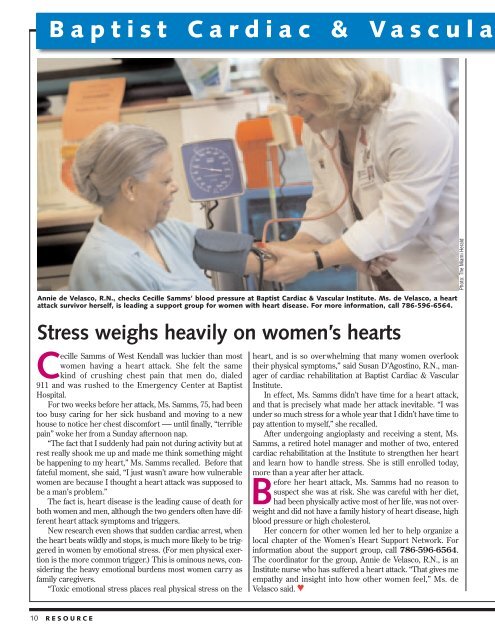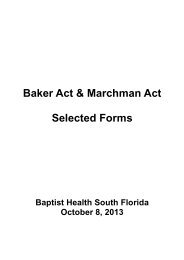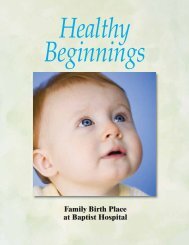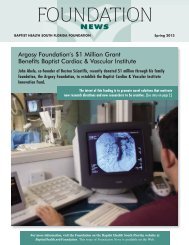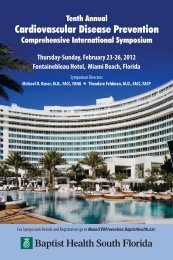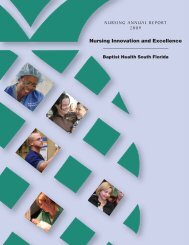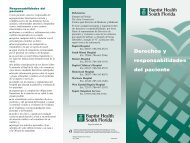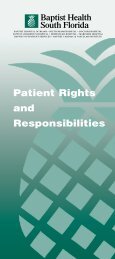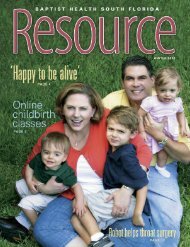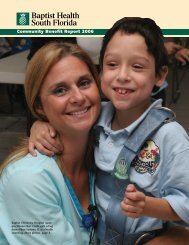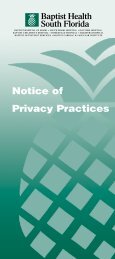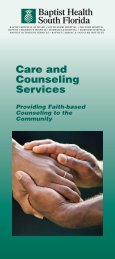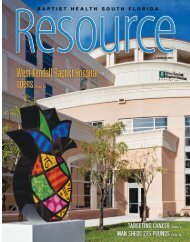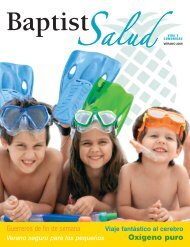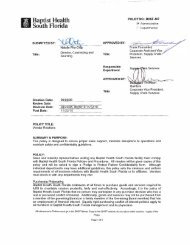Resource: Spring 2004 - Baptist Health South Florida
Resource: Spring 2004 - Baptist Health South Florida
Resource: Spring 2004 - Baptist Health South Florida
- TAGS
- baptist
- baptisthealth.net
Create successful ePaper yourself
Turn your PDF publications into a flip-book with our unique Google optimized e-Paper software.
<strong>Baptist</strong> Cardiac & Vascula<br />
Annie de Velasco, R.N., checks Cecille Samms’ blood pressure at <strong>Baptist</strong> Cardiac & Vascular Institute. Ms. de Velasco, a heart<br />
attack survivor herself, is leading a support group for women with heart disease. For more information, call 786-596-6564.<br />
Stress weighs heavily on women’s hearts<br />
Cecille Samms of West Kendall was luckier than most<br />
women having a heart attack. She felt the same<br />
kind of crushing chest pain that men do, dialed<br />
911 and was rushed to the Emergency Center at <strong>Baptist</strong><br />
Hospital.<br />
For two weeks before her attack, Ms. Samms, 75, had been<br />
too busy caring for her sick husband and moving to a new<br />
house to notice her chest discomfort —- until finally, “terrible<br />
pain” woke her from a Sunday afternoon nap.<br />
“The fact that I suddenly had pain not during activity but at<br />
rest really shook me up and made me think something might<br />
be happening to my heart,” Ms. Samms recalled. Before that<br />
fateful moment, she said, “I just wasn’t aware how vulnerable<br />
women are because I thought a heart attack was supposed to<br />
be a man’s problem.”<br />
The fact is, heart disease is the leading cause of death for<br />
both women and men, although the two genders often have different<br />
heart attack symptoms and triggers.<br />
New research even shows that sudden cardiac arrest, when<br />
the heart beats wildly and stops, is much more likely to be triggered<br />
in women by emotional stress. (For men physical exertion<br />
is the more common trigger.) This is ominous news, considering<br />
the heavy emotional burdens most women carry as<br />
family caregivers.<br />
“Toxic emotional stress places real physical stress on the<br />
10 RESOURCE<br />
heart, and is so overwhelming that many women overlook<br />
their physical symptoms,” said Susan D’Agostino, R.N., manager<br />
of cardiac rehabilitation at <strong>Baptist</strong> Cardiac & Vascular<br />
Institute.<br />
In effect, Ms. Samms didn’t have time for a heart attack,<br />
and that is precisely what made her attack inevitable. “I was<br />
under so much stress for a whole year that I didn’t have time to<br />
pay attention to myself,” she recalled.<br />
After undergoing angioplasty and receiving a stent, Ms.<br />
Samms, a retired hotel manager and mother of two, entered<br />
cardiac rehabilitation at the Institute to strengthen her heart<br />
and learn how to handle stress. She is still enrolled today,<br />
more than a year after her attack.<br />
Before her heart attack, Ms. Samms had no reason to<br />
suspect she was at risk. She was careful with her diet,<br />
had been physically active most of her life, was not overweight<br />
and did not have a family history of heart disease, high<br />
blood pressure or high cholesterol.<br />
Her concern for other women led her to help organize a<br />
local chapter of the Women’s Heart Support Network. For<br />
information about the support group, call 786-596-6564.<br />
The coordinator for the group, Annie de Velasco, R.N., is an<br />
Institute nurse who has suffered a heart attack. “That gives me<br />
empathy and insight into how other women feel,” Ms. de<br />
Velasco said. ♥<br />
Photo: The Miami Herald


